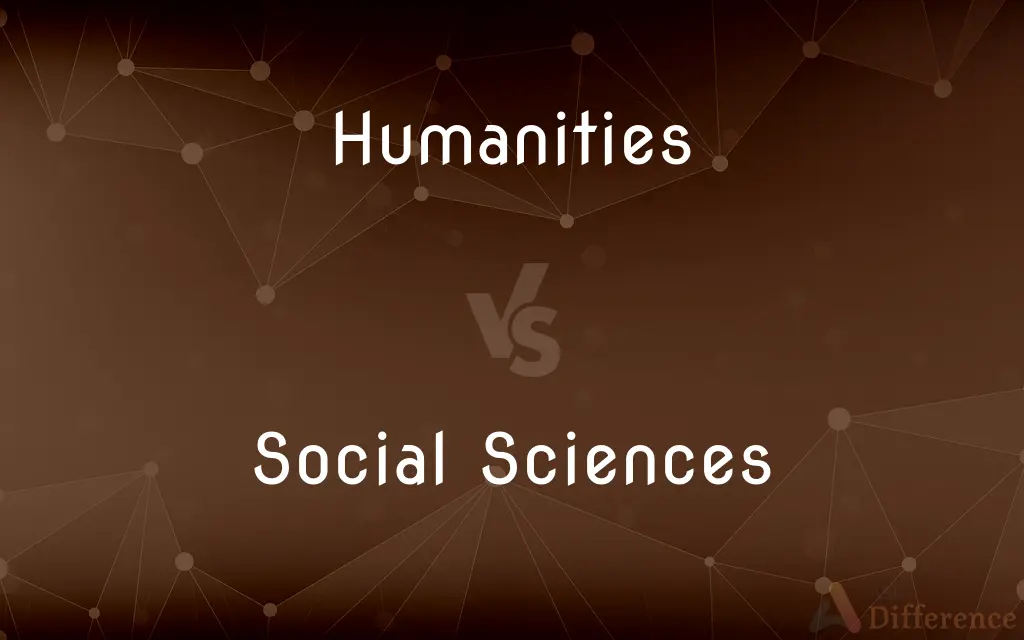Humanities vs. Social Sciences — What's the Difference?
By Tayyaba Rehman — Published on December 29, 2023
Humanities explore human culture and experience, while Social Sciences study societal structures and behavior.

Difference Between Humanities and Social Sciences
Table of Contents
ADVERTISEMENT
Key Differences
Humanities refer to academic disciplines that study aspects of human society and culture. Through literature, art, philosophy, and history, Humanities delve into understanding the human experience, emotions, thoughts, and ideas. Social Sciences, on the other hand, focus on the scientific study of human behavior and societies, often employing empirical methods.
In the realm of Humanities, one may study the philosophical works of ancient Greece, the literature of the Renaissance, or the art of the Romantic period. These disciplines emphasize the subjective nature of human experience and the value of individual interpretation. Conversely, Social Sciences such as sociology, anthropology, or economics aim to understand patterns, structures, and systems within societies, and often utilize statistical methods.
While Humanities might analyze a poem to understand the human condition or the cultural context of a particular time, Social Sciences might conduct surveys or experiments to analyze societal trends or behavioral patterns. Humanities primarily rely on qualitative analysis, while Social Sciences often favor quantitative methods.
A scholar in the Humanities might ponder over the symbolism in a classic novel, exploring the deeper meanings and cultural implications. Social Sciences practitioners, however, could research the impact of a specific policy on a community, using data and empirical evidence to draw conclusions.
Both Humanities and Social Sciences offer invaluable insights into the human experience. While Humanities tend to be more introspective and analytical of human nature and culture, Social Sciences are more externally focused, studying the systems and structures that govern human behavior.
ADVERTISEMENT
Comparison Chart
Nature
Subjective, interpretive
Empirical, analytical
Methods
Qualitative
Quantitative
Focus
Human culture, experience, emotions, and ideas
Human behavior, societal structures, and systems
Examples
Literature, Art, Philosophy
Sociology, Anthropology, Economics
Analysis
Deep introspection of cultural context
Data-driven study of societal patterns
Compare with Definitions
Humanities
The exploration of human values, ideas, and cultural symbols.
By studying Humanities, we recognize the shared values across cultures.
Social Sciences
Academic disciplines analyzing societal structures and relationships.
Through Social Sciences, we can evaluate the impact of policies on communities.
Humanities
A realm that delves into human emotions, thoughts, and interpretations.
The Humanities allow us to understand the essence of humanity.
Social Sciences
The exploration of patterns, behaviors, and structures within human groups.
Social Sciences help in understanding the factors influencing human decisions.
Humanities
Disciplines that emphasize human subjectivity and individual interpretation.
Through the Humanities, one can interpret the deeper meanings behind artworks.
Social Sciences
Fields that study the dynamics and systems governing human interactions.
Social Sciences explore how economies shape societies.
Humanities
Humans considered as a group; the human race.
Social Sciences
Research areas employing empirical and statistical methods.
Social Sciences use data to draw conclusions about societal trends.
Humanities
The condition or quality of being human.
Social Sciences
The scientific study of human behavior and societies.
Social Sciences enable us to understand patterns in human interactions.
Humanities
The quality of being humane; benevolence.
Humanities
A humane characteristic, attribute, or act.
Humanities
The languages and literatures of ancient Greece and Rome; the classics.
Humanities
Those branches of knowledge, such as philosophy, literature, and art, that are concerned with human thought and culture.
Humanities
Plural of humanity
Humanities
(obsolete) classical studies: the study of Ancient Greek and Latin, their literature, etc.
Humanities
The study of language, literature, the arts, history, and philosophy, sometimes including religion.
Humanities
Studies intended to provide general knowledge and intellectual skills (rather than occupational or professional skills);
The college of arts and sciences
Humanities
The study of human culture and experience.
Through the Humanities, we explore the artistic expressions of different civilizations.
Humanities
Academic disciplines focusing on literature, art, and philosophy.
The Humanities provide insights into the narratives of past societies.
Common Curiosities
Why are Humanities important?
Humanities offer insights into human culture, values, and interpretations, enriching our understanding of the human experience.
Which disciplines fall under Social Sciences?
Disciplines like sociology, anthropology, economics, and psychology are part of Social Sciences.
What do the Humanities primarily study?
Humanities primarily study human culture, experience, emotions, and ideas.
How do the methodologies in Humanities differ from Social Sciences?
Humanities emphasize qualitative analysis, while Social Sciences lean towards quantitative methods.
How do Humanities contribute to society?
Humanities foster critical thinking, empathy, cultural appreciation, and a deeper understanding of human values.
Are Social Sciences purely scientific?
While Social Sciences employ scientific methodologies, they also consider human complexities, nuances, and societal contexts.
Can one pursue a combined degree in Humanities and Social Sciences?
Yes, many institutions offer interdisciplinary programs that blend both areas.
How do Humanities and Social Sciences complement each other?
While Humanities provide a deep introspective view of human nature and culture, Social Sciences offer an external perspective on human behavior and societal structures.
Can a topic be studied both through the lens of Humanities and Social Sciences?
Absolutely. For instance, a historical event can be analyzed culturally (Humanities) and sociologically (Social Sciences).
What's the primary difference in the approach of Humanities vs. Social Sciences?
Humanities approach subjects with introspection and interpretation, while Social Sciences employ empirical analysis.
Are history and archaeology part of Humanities or Social Sciences?
They can be considered both. History is often categorized under Humanities, while archaeology can bridge Humanities and Social Sciences.
In which areas do both Humanities and Social Sciences overlap?
Areas like history, archaeology, and cultural studies often see an overlap between Humanities and Social Sciences.
Why are Social Sciences crucial in policymaking?
Social Sciences provide data-driven insights into societal patterns and behaviors, aiding in informed policymaking.
How do Humanities influence art and literature?
Humanities delve into the cultural, philosophical, and emotional contexts, enriching art and literature with depth and meaning.
How do Social Sciences impact our daily lives?
Social Sciences influence policies, societal structures, and our understanding of human interactions.
Share Your Discovery

Previous Comparison
Object Oriented Database vs. Object Relational Database
Next Comparison
Perpetual Inventory System vs. Periodic Inventory SystemAuthor Spotlight
Written by
Tayyaba RehmanTayyaba Rehman is a distinguished writer, currently serving as a primary contributor to askdifference.com. As a researcher in semantics and etymology, Tayyaba's passion for the complexity of languages and their distinctions has found a perfect home on the platform. Tayyaba delves into the intricacies of language, distinguishing between commonly confused words and phrases, thereby providing clarity for readers worldwide.












































